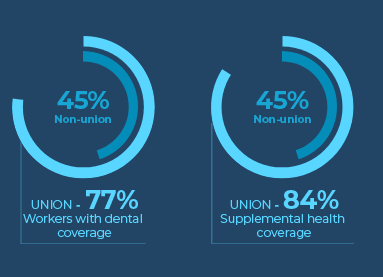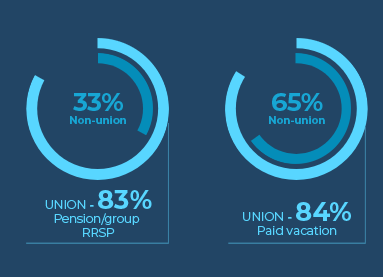Benefits of Unions
Among the greatest benefits of unions is the fact unionized workers in Alberta typically enjoy higher wages. Thanks to collective bargaining contracts, they often get better health, dental, and life insurance benefits and greater job security.
Union members usually have clearly defined work hours, paid overtime, and are often entitled to more paid vacation days compared to non-union workers. On top of that, unionized workplaces in Alberta tend to have established processes for addressing grievances, which can lead to a fairer resolution of workplace disputes. Let’s take a closer look.

EARN A
HIGHER WAGE
On average, unions are able to negotiate better wages for their members. According to statistics, union members higher wages than their non-union employees. Source: Canadian Wages: Trends and Challenges (2023)
among part-time unionized workers
among full-time unionized workers
Total union advantage for the Alberta economy



Closing THE GENDER WAGE GAP:
FIGHTING FOR WOMEN
In North America, women have long demanded equal pay for equal work. Unions have been a leading force in fighting for wage equality, regardless of gender. As a result, women in unions earn $7.76 more per hour than non-unionized workers.
Unions negotiate wages and benefits on behalf of all workers – and don’t differentiate based on gender.

supporting NEW CANADIANS
INVESTING IN EXPERIENCE
Landed immigrants who belong to a union earned 3.97 percent more than those who do not. Together, new Canadians in Alberta earned $10.1 million more. This goes a long way toward supporting these workers their families.
JOBS THAT WORK FOR YOUNG PEOPLE
OUR FUTURE
Union workers aged 16-24 earned on average $4.92 more per hour than non-unionized young people.
GREATER JOB SECURITY
Secure YOUR FUTURE
Union members are part of collective agreements with their companies, which protect them from any unexpected changes in the terms of their employment. This provides security for members and their families today and down the road, as jobs are safe and regular pay increases are guaranteed through routine collective bargaining.
Think of it this way. You take out insurance on your home and car to protect their value. Paying union dues is similar; it’s an investment in your job and your future.

YOUR UNION
IS YOUR VOICE
Have something to say about how you or your peers are treated at work? Being part of a union means that complaints and grievances cannot be ignored like they can in non-unionized environments. Unions hold management accountable for their actions, so members with workplace issues can expect to see results, not reprimands.
REAP THE
BENEFITS
While we in Canada enjoy free health care, there are other very important health services that are difficult to afford without employer benefits. And what about pensions, group RRSP and paid vacation?

EXERCISE YOUR
LEGAL RIGHT TO ORGANIZE
While there is a basic standard that all employers, unionized or not, must follow, not all workers’ rights are protected by the government. Unfortunately, many workers are unaware of even these basic rights and end up being mistreated. One major right that is afforded to everyone in Canada regardless of industry is the right to organize your workplace; to assemble, participate in and be protected by a labour union. There are several important steps to follow when considering forming a bargaining unit in your workplace, but the first step is knowing you are legally entitled to be part of a union, no matter who you are.




